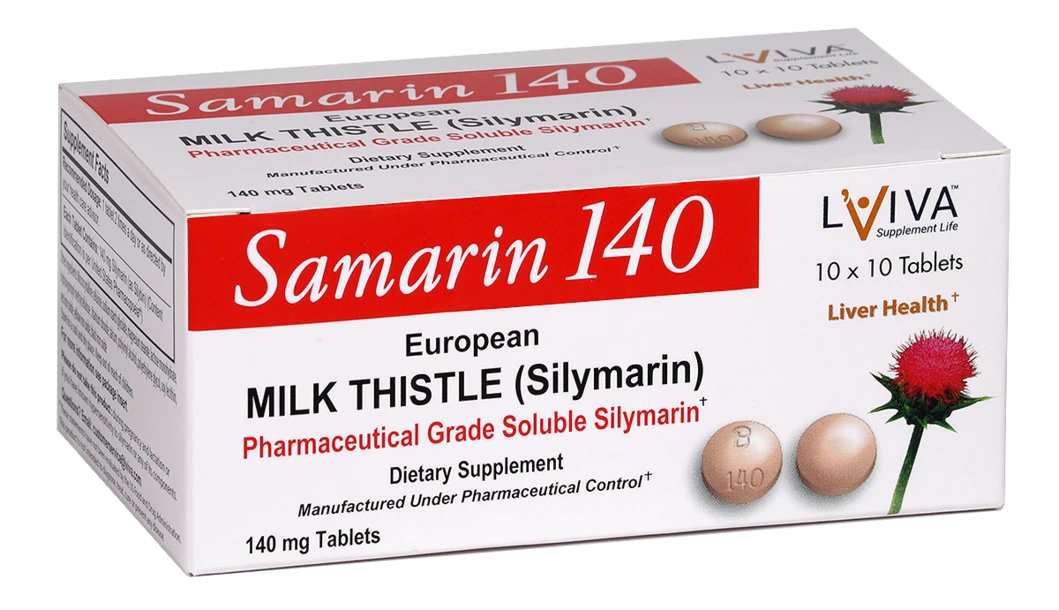About Samarin®
Samarin® is highly soluble and bioavailable form of Silymarin, also known as Milk Thistle, which in natural form is largely insoluble and is not absorbed well in the body.
Samarin® contains pharmaceutical-grade, proprietary formulation of bio-active components isolated from European Silymarin.
Samarin® is manufactured in a GMP-certified pharmaceutical plant. The product is approved as a drug for the treatment of liver disease in five countries by their respective FDAs and is sold there as a pharmaceutical medicine. (In the U.S. Silymarin is considered a herbal supplement and doesn’t require FDA approval.)
Natural Silymarin is Poorly Absorbed
The natural form of Silymarin when administered is largely excreted out in bile and urine, and does not deliver health benefits. “Although it has been proved by clinical trials that silymarin is safe at high doses (>1500 mg/day) in humans, pharmacokinetic studies revealed poor absorption, rapid metabolism, and ultimately poor oral bioavailability of silymarin (Javed et al., 2011, p. 239).” (Phytonanoconjugates in oral medicine L. Bharathi Priya, ... V. Vijaya Padma, in Nanostructures for Oral Medicine, 2017)
“Silymarin is a polyphenolic flavonoid mixture isolated from the seeds of milk thistle (Silybum marianum), composed mainly of silibinin (or silybin), which is thought to be the primary bioactive component, and lesser amounts of silydianin and silychristin (all silibinin stereoisomers). In addition, silibin itself consists of two diastereomers, silibinin A and B. Most studies have measurerd only the total amount of silibin A and B, rather than each diasteromer separately. In describing drug disposition, it is important to discuss liberation (an important aspect for a complex herbal preparation), absorption, distribution, metabolism, and excretion.
Overcoming the Challenge of Poor Bioavailability
Silibinin is poorly absorbed and efforts to improve its bioavailability have been only partially successful. In both animal models and humans, the bioavailability of silibinin ranges from 20% to 50% following oral administration. Chemical complexation with phosphatidylcholine (forming silipide) greatly increases the lipophilic properties of silibinin and hence improves its bioavailability.
Oral administration of silipide formulations result in plasma silibinin concentrations that are several-fold higher than those achieved with standard silibinin (i.e., the mixture of any number of these constituents) or silymarin preparations in equimolar dosages (i.e., those doses that ideally have the same amount of silibinin) and overall enhanced bioavailability. Absorption is fairly rapid, with peak plasma concentrations (Cmax) reached in approximately 2 to 4 hours (Tmax).” (Clinical Studies of Silymarin/ Clinical Pharmacokinetics of Silymarin: John Markowitz, Pharm. D., Associate Professor, Department of Pharmaceutical Sciences, Laboratory of Drug Disposition and Pharmacogenetics, Medical University of South Carolina, Charleston, SC.)
Reformulations of bioactive components of Silymarin may not result in similar plasma concentrations and bioavailability between products, as they vary from manufacturer to manufacturer. Chemical complexation and the manufacturing process are jealously guarded by manufacturers.
Samarin® has been tested by independent labs against leading brands, and it has demonstrated superior solubility.
Dissolution test for solubility comparison between Samarin® and a leading originator brand*


*Dissolution test was conducted comparing Samarin (manufactured by Berlin Pharmaceutical Industry) to the originator brand (manufactured in Germany)
Samarin® showed solubility and dissolution of more than 90% at the 10th minute and remained at that level for a period of 60 minutes, compared with the competing brand’s 45.6% at the 10th minute and 67.5% through the 60-minutes test period.
Samarin® Pharmacokinetics
- Reached maximum blood level in 1.5 hours
- Metabolized in the liver
- Mainly excreted in the bile
- Elimination half-life : 6 to 8 hours
Samarin® Recommended Dose & Administration
- Initial dose in severe cases: 140 mg three times daily
- Maintenance dose: 140 mg twice daily
- No dose adjustment in mild-to-moderate renal impairment
Samarin®
Facts about the brand*
- Samarin® contains pharmaceutical-grade of silymarin manufactured at a European GMP facility.
- Samarin® has been tested by an independent lab showing its soluble silymarin content is on average 105.8% of the product's label claim, in compliance with US Pharmacopeia (USP 38) specifications.
- Samarin® has been tested by an independent lab demonstrating it dissolves twice the rate of some leading brands.
- Samarin® has been tested by an independent lab confirming that 98.5% to 101.5% of the label amount dissolves in 45 minutes, significantly higher than the 75% minimum established by the US Pharmacopeia's most recent standard (USP 38).

All tests of product quality were performed with HPLC and in accordance with standardized test methods.
‡These statements have not been evaluated by the US FDA
*Product statements have not been approved by the US FDA. The product is not intended to treat, cure or prevent disease.
DISCLAIMER: The information offered should not be construed as medical advice; please consult your doctor before taking Silymarin, and nothing you have read here should cause you to delay seeking medical advice.


